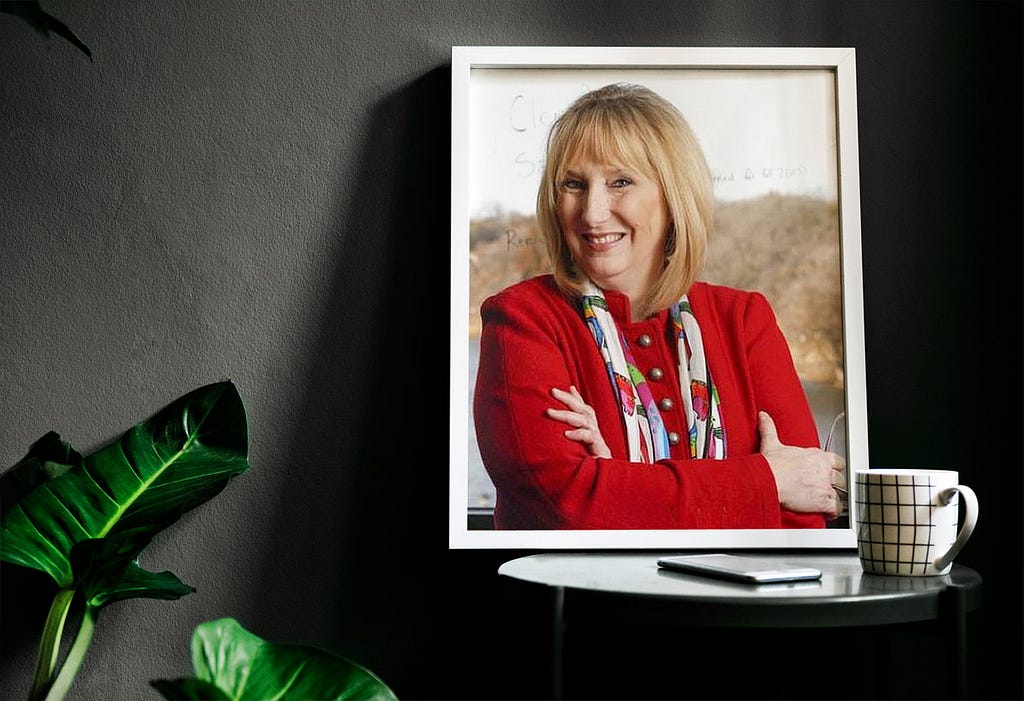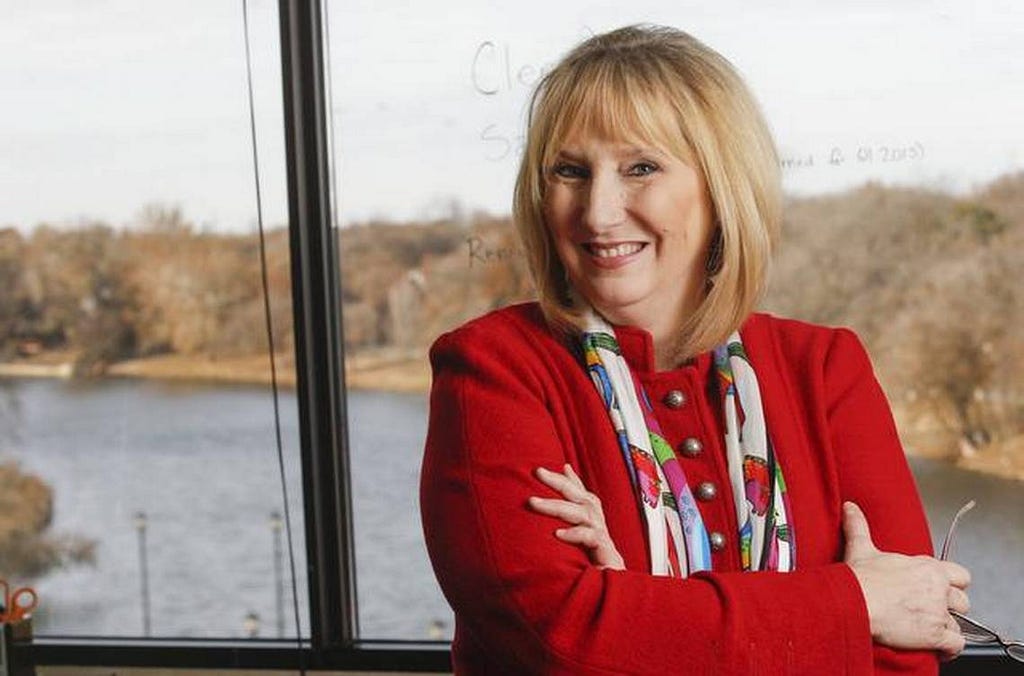“The Five Things We Need to do to Close the Gender Wage Gap”, with Christie Summervill and Candice Georgiadis

Make the case for profitability. I think a lot of times people think that doing something positive about wage inequality is going to mean negative consequences for business, but we’ve found that the opposite is actually true. It’s fairly simple: if you’re a company that has a reputation for equitable compensation, you have an easier time recruiting and retaining top talent. That reputation creates a positive feedback loop where you get the best employees who stick around longer and contribute more to your company’s success.
I had the pleasure of interviewing Christie Summervill. When Christie Summervill founded BalancedComp in 2010, her goal was nothing less than to radically reimagine salary administration. With over two decades of leadership in business, Summervill saw that the financial services sector could be getting more out of their compensation strategies, but technology and data quality were holding them back from gaining true insights. What banks and credit unions didn’t need was another complicated spreadsheet, instead, Summervill envisioned a new paradigm for bringing the human back into human resources. The creation of BalancedComp signaled a momentous shift in the landscape of salary administration; a new era where big data started to work for the benefit of people, and financial institutions could begin to benefit from fully integrated compensation design. Summervill envisioned integrated compensation design as a holistic application of data, market analysis and human experience applied to salary and incentive planning in the financial services industry. In the same way that banks and credit unions rationalized lending processes using a variety of tools and inputs, Summervill wanted HR departments to have the structure and information they needed to make confident and knowledgeable decisions about their compensation strategy. Recognizing that compensation design begins with quality data, Summervill builds products for banks and credit unions that apply BalancedComp’s industry-recognized salary survey data to the unique circumstances of each client. The combination of data, technology and customer-focused consulting results in both profitability and equitable salary administration for BalancedComp’s customers. At each stage of innovation, Summervill brings a keen understanding of what matters to the people who use BalancedComp’s products and services. For Summervill, true integrated compensation design means coming alongside her clients in collaboration. Many of the features in BalancedComp’s performance management software are a result of close consultation over years with HR professionals in banking. Her hands-on approach to consulting allows Summervill to see the challenges their clients face first-hand, and her experiences across hundreds of banks and credit unions gives her the expertise to bring novel and effective solutions to the table. In the 10 years since Summervill founded BalancedComp she has grown the company from a regional upstart to a nationally-known and respected compensation design firm, focusing exclusively on financial institutions. BalancedComp advises large and mid-sized banks and credit unions with assets as large as $20B. Summervill’s team of experts in economics, design and data science create and leverage the most comprehensive market reporting available to consistently deliver actionable insights that result in greater equity and profitability for clients undergoing mergers and acquisitions, de novo review and annual compensation alignments.
Thank you so much for joining us! Can you tell us the “backstory” that brought you to this career path?
I’ve loved sales from the time I was a kid selling Girl Scout cookies. Being a salesperson has always been about getting to know other people, listening to their stories and helping them solve problems. When I first started selling in the compensation industry, I worked for a firm where sales weren’t as sophisticated as they could have been. I could still see that there was a lot of potential for positive impact in this field, but in order to achieve that, I needed to strike out on my own.
Can you share the most interesting story that happened to you since you began this career?
One of the most surprising things we run across in compensation design is how commonplace gender discrimination is, even in 2019. I recently encountered an executive who was in charge of certifying appraisers. There were two employees to certify, a man and a woman, and the executive asked the woman to wait on certification, explaining that she could be much more useful to the bank in her current role. She agreed, not knowing that the certification came with a $35,000 pay increase. Why didn’t he ask the man? Why not support both employees in their career advancement? The problem was that this executive was allowed to make decisions based on his intuition and unexamined biases, rather than a rational metric for determining performance.

Can you explain three of the main factors that are causing the wage gap?
Gendered income inequality has been with us for a long time, and there are three broad factors that each play a part in maintaining it: historic, economic and technological. It’s a complicated issue, but in general, women historically have faced discrimination in the workplace, and not only focused on salaries — we’ve all heard of the glass ceiling, for example.
Economically, gendered discrimination is most obvious when comparing paychecks, but this factor also has to do with how women participate in the workforce. For instance, many women leave the workforce shortly after they have children, and there’s not been an agreed upon way to account for this so-called employment gap, yet.
Finally, technology hasn’t been brought to bear on the problem in the ways that it could be, or at least, that’s our proposition at BalancedComp. Given the right tools and high-quality data, we think we can use technology to overcome the challenges presented by the previous two factors and bring actual objectivity to compensation for everyone.
Can you share with our readers what your work is doing to help close the gender wage gap?
At BalancedComp, we combine thorough research, data-driven insights, and the latest technology to create intuitive tools for managing compensation and performance reviews in the financial industry. Our platforms help to clarify compensation strategies in order to take a lot of the subjectivity out of the decision-making process. Obviously, there’s always going to be some qualitative component in any human endeavor, but I think we can get a lot closer to knowing what a job should pay based on objective criteria. The end goal is to create actual equity, not just for gender, but for race, age, sexuality — we recently introduced a third gender category in our apps, for example. We hope our work contributes to solving all of these inequalities.
Can you recommend 5 things that need to be done on a broader societal level to close the gender wage gap?
Observe.
First, you have to understand what is really happening in the world. Yes, there is actual gender discrimination and wage disparity, but we need to get better at asking why. The answers are usually more complicated than they first appear.
Rationalize.
Once you see clearly what the problem is, it’s time to figure out what the solution should look like. Do we solve wage gaps by paying everyone the same salary regardless of any other factors, or can we develop equitable solutions that truly account for each individual’s real experiences?
Expand the definition of work.
Part of the wage gap is caused by an inability of the jobs market to account for non-wage work, the majority of which is undertaken by women. This includes stay-at-home moms, but also caregiving for sick or elderly family members and other domestic labor. Having the tools to properly assess someone’s actual experience and skill sets beyond a formal work history can help give a greater clarity to the question of what they should be paid.
Make the case for profitability.
I think a lot of times people think that doing something positive about wage inequality is going to mean negative consequences for business, but we’ve found that the opposite is actually true. It’s fairly simple: if you’re a company that has a reputation for equitable compensation, you have an easier time recruiting and retaining top talent. That reputation creates a positive feedback loop where you get the best employees who stick around longer and contribute more to your company’s success.
Be bold and talk about your successes (and sometimes your struggles).
It’s not easy to lead the way, but those companies that create true innovation and societal advancement are the companies we all remember and look to for inspiration. We want to hear about companies that are succeeding at bringing equity to their compensation strategies — it’s great news and should be celebrated! It’s also important to engage the difficulties in order to find better solutions. At BalancedComp, we are always looking for that next challenge: what did we do right today, and what will be difficult tomorrow?

You are a person of great influence. If you could inspire a movement that would bring the most amount of good to the most amount of people, what would that be? You never know what your idea can trigger. 🙂
I’d love it if all businesses would begin rationalizing how they pay their employees and develop an understanding that profitability is a goal, not a tactic. The current method for a lot of companies is to treat profitability as opposed to spending money on compensation, but my experience is that it’s almost the opposite case. Companies that understand how to pay their employees appropriately, and not just however little they can get away with, tend to perform much better in the long run. Recruitment, retention and productivity all increase when your people are making enough money to stay focused on their job, and focused on improving at their job. Paying well to begin with and having an objective plan for raises and bonuses can make a huge impact on a company’s bottom line, and not only for the company! The employees benefit, too, by having resources to improve their lives, whether that’s buying a house, saving for a vacation or starting a family.
Can you please give us your favorite “Life Lesson Quote”? Can you share how that was relevant to you in your life?
“If you want to go fast, go alone, if you want to go far, go together” — author unknown
I’ve always felt that this quote is a perfect way to describe my startup. At the beginning, when I was by myself I could make quick decisions, but it was a lot harder to make strategic decisions. Now that I’ve got a team of brilliant people, we can all take the time to really think about where we want the company to go, sometimes even far out into the future. It isn’t an opposition between fast and far — we can still go plenty fast — but for me the quote is all about understanding how you approach a task or a job has a lot to do with what you’ll eventually get out of it.
We are very blessed that some of the biggest names in Business, VC funding, Sports, and Entertainment read this column. Is there a person in the world, or in the US whom you would love to have a private breakfast or lunch with, and why? He or she might see this, especially if we tag them. 🙂
Mother Teresa, because of the work she did with the poor, she could have used her celebrity in her own self-interest, but she used it to continue to help others. One of our core values is generosity. We don’t want to be merely a successful company, we want to leave the world better than we found it. Everything we’re doing is about doing good: by the businesses, by the employees, by our team at BalancedComp. Solving comp has a real impact on actual lives.
Thank you for all of these great insights!
“The Five Things We Need to do to Close the Gender Wage Gap”, with Christie Summervill and Candice… was originally published in Authority Magazine on Medium, where people are continuing the conversation by highlighting and responding to this story.

